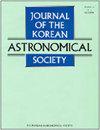用KVN寻找agn的日变异性
IF 0.8
4区 物理与天体物理
Q3 ASTRONOMY & ASTROPHYSICS
引用次数: 0
摘要
活动星系核(AGN)在所有时间尺度上都以不规则的变化而闻名,小到一天内的变化,在几分钟到几小时内相对变化几个百分点。在如此短的时间尺度上,仍然存在一些未开发的领域,例如可能存在最短的活动特征时间尺度和AGN功率谱的高频端形状。我们介绍了用韩国VLBI网络(KVN)进行的AGN单碟快速光度测定的结果。观测以“反相关”模式进行,使用两个天线,总是至少有一个天线指向目标。这将导致不到三分钟的有效时间分辨率。我们使用了所有四个KVN频率,22、43、86和129 GHz,以跟踪频谱变化,如果有的话。在2012年5月至2013年4月期间,我们能够获得3C 111, 3C 454.3和BL Lacertae在22和43 GHz以及3C 279在86 GHz的高质量光曲线。我们进行了详细的统计分析,以评估变异性的水平和相应的上限。我们发现通量可变性的上限在~ 1.6%到~ 7.6%之间。导出的亮度温度的上限超过逆康普顿极限三到六个数量级。从我们的结果,再加上与密歇根大学射电天文台获得的数据的比较,我们得出结论,我们没有探测到源的内在变化,这种变化必须在低于百分之一的水平上发生。本文章由计算机程序翻译,如有差异,请以英文原文为准。
A SEARCH FOR AGN INTRA-DAY VARIABILITY WITH KVN
Active galactic nuclei (AGN) are known for irregular variability on all time scales, down to intra-day variability with relative variations of a few percent within minutes to hours. On such short timescales, unexplored territory, such as the possible existence of a shortest characteristic time scale of activity and the shape of the high frequency end of AGN power spectra, still exists. We present the results of AGN single-dish fast photometry performed with the Korean VLBI Network (KVN). Observations were done in a “anti-correlated” mode using two antennas, with always at least one antenna pointing at the target. This results in an effective time resolution of less than three minutes. We used all four KVN frequencies, 22, 43, 86, and 129 GHz, in order to trace spectral variability, if any. We were able to derive high-quality light curves for 3C 111, 3C 454.3, and BL Lacertae at 22 and 43 GHz, and for 3C 279 at 86 GHz, between May 2012 and April 2013. We performed a detailed statistical analysis in order to assess the levels of variability and the corresponding upper limits. We found upper limits on flux variability ranging from ∼1.6% to ∼7.6%. The upper limits on the derived brightness temperatures exceed the inverse Compton limit by three to six orders of magnitude. From our results, plus comparison with data obtained by the University of Michigan Radio Astronomy Observatory, we conclude that we have not detected source-intrinsic variability which would have to occur at sub-per cent levels.
求助全文
通过发布文献求助,成功后即可免费获取论文全文。
去求助
来源期刊

Journal of the Korean Astronomical Society
地学天文-天文与天体物理
CiteScore
1.30
自引率
10.00%
发文量
0
审稿时长
>12 weeks
期刊介绍:
JKAS is an international scientific journal publishing papers in all fields of astronomy and astrophysics. All manuscripts are subject to the scrutiny of referees. Manuscripts submitted to JKAS must comply with the ethics policy of JKAS. Six regular issues are published each year on February 28, April 30, June 30, August 31, October 31, and December 31. One year''s issues compose one volume.
 求助内容:
求助内容: 应助结果提醒方式:
应助结果提醒方式:


